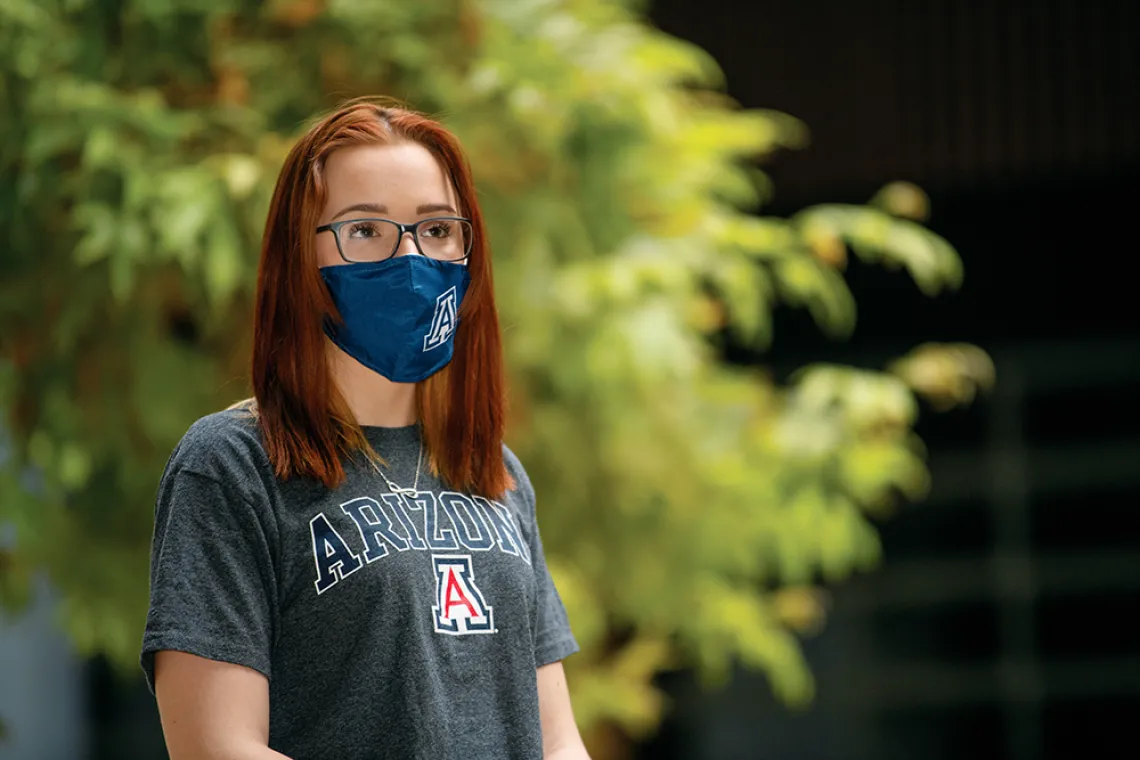Strong Throughout the Struggle

The moment the COVID-19 pandemic began presenting obstacles, Wildcats started producing answers, hope and help. Take a look back at the ways the University of Arizona community has stepped up in areas including prevention, testing and vaccination.
2020
March • Amid a shortage of COVID-19 specimen collection kits, David Harris, Ph.D., of the UArizona Health Sciences Biorepository and his team lead scientists across the university in producing thousands of kits for testing.
April • UAHS sends 250 sample collection kits to the Navajo Nation in Window Rock, Arizona, to help combat the pandemic’s spread.
April • UAHS researchers Dr. Janko Nikolich-Žugich, Ph.D., and Deepta Bhattacharya, Ph.D., develop the most sensitive and precise antibody test in the nation.
April • University leaders tap UArizona Vice President for Strategic Initiatives Jane Hunter, Ph.D., to establish COVID-19 real-time polymerase chain reaction, or RT-PCR, and antigen testing clinics on campus for students, faculty and staff and set up labs to process the results.
May • University President Dr. Robert C. Robbins sets up an Incident Command System, naming the 17th Surgeon General of the United States, Dr. Richard Carmona, Ph.D.,as director of campus reentry. The ICS deployed a Test, Trace, Treat strategy to respond to the pandemic.
May • UAHS researchers launch Arizona CoVHORT — the first statewide long-term public health study of COVID-19, providing data on individual susceptibility and recovery. The Arizona CoVHORT research study will compare health outcomes for Arizonans who tested positive for the novel coronavirus to those of Arizonans who were not infected. Led by Kristen Pogreba-Brown, Ph.D., MPH, assistant professor in the UArizona Mel and Enid Zuckerman College of Public Health, Department of Epidemiology and Biostatistics, the study will collect information on pre-existing conditions such as cancer, hypertension and diabetes as well as basic data such as sex, race, ethnicity and occupation.
August • By tracking COVID-19 through wastewater on campus, researchers Ian Pepper, Ph.D., and Charles Gerba, Ph.D., prevent a dorm outbreak, attract major national media coverage and provide a model for widespread replication of this lifesaving technology.
August • The Covid Watch exposure notification smartphone app launches as the result of a partnership between UArizona and the nonprofit organization Covid Watch, co-founded by Tina White ’07 ’09. Joyce Schroeder, Ph.D., leads the university’s science team.
October • UAHS researchers publish a study investigating the possibility that the virus causing COVID-19 can
relieve pain.
October • Michael Worobey, Ph.D., head of the Department of Ecology and Evolutionary Biology, tests and brings the saltwater gargle test to campus as an alternative to swab and saliva tests.
November • Football season begins. Arizona Athletics never misses a football or men’s or women’s basketball game due to COVID-19. The medical team, led by Dr. Stephen Paul and Dr. Donald Porter, sets the standard in the Pac-12 for preventing infection among teams.
December • Researchers determine Covid Watch helped curb the virus’s spread among the university community as a complement to traditional contact tracing, in addition to testing and isolation efforts. The app also is used at Northern Arizona University.
December • As the first vaccines became available in the United States, a team from the university and community ICS moves quickly to create a “freezer farm” capable of storing 1.5 million doses of vaccine at ultracold temperatures.
2021
January • In partnership with the Pima County Health Department, the ICS opens a COVID-19 vaccine point of distribution, or POD, on the Mall.
January • Under the leadership of Chris Kopach, assistant vice president of facilities management, the university POD collaborates with Pima County and then the state of Arizona to administer nearly 250,000 vaccine doses.
March • UArizona researchers publish a study in Science estimating that the virus that causes COVID-19 emerged as early as October 2019.
March • UAHS researchers are the first in the U.S. to measure COVID-19 vaccine effectiveness among first responders, health care and front-line workers through the Arizona Healthcare, Emergency Response, and Other Essential Workers Surveillance (AZ HEROES) study. Early findings show mRNA vaccines are highly effective in real-world working conditions.
May • UArizona is the only state university to hold in-person commencement ceremonies with guests.
